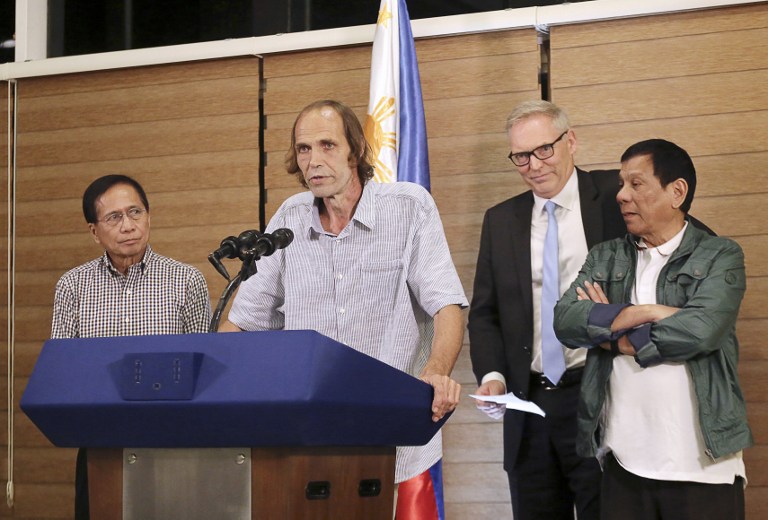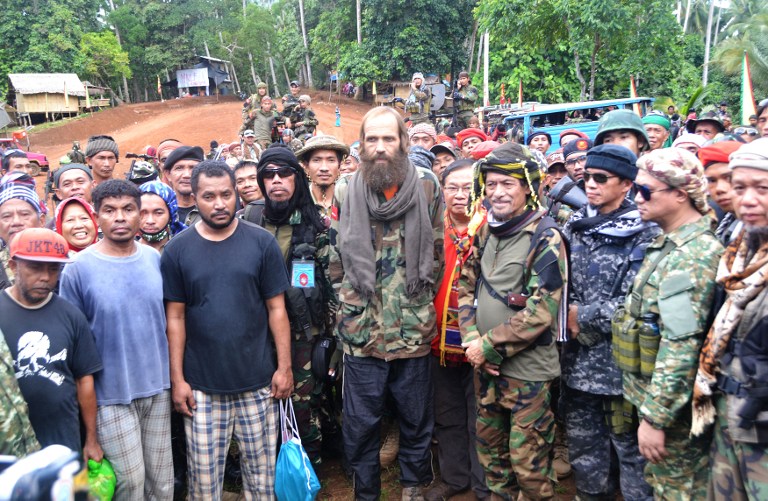
A Norwegian and three Indonesian seamen held hostage in the southern Philippines were turned over to a government envoy on September 18 after being freed by Islamic extremists who had beheaded two captives earlier this year. / AFP PHOTO / MANMAN DEJETO
INDANAN, Philippines (AFP) — A Norwegian former hostage on Sunday described his psychological torture as he heard his friends being beheaded by Islamic militants during a year-long captivity in the southern Philippines.
A heavily bearded and gaunt Kjartan Sekkingstad, who was released on Saturday by the feared Abu Sayyaf group, also said he narrowly survived military attacks against his captors, with a bullet piercing his backpack.
“Basically, I’ve been treated like a slave, carrying their stuff around, time to time abused,” a frail-looking Sekkingstad said as he was received by a government envoy in the town of Indanan on the forested island of Jolo.
Also released were three Indonesians held by the group, who were also turned over to envoy Jesus Dureza.
Sekkingstad told reporters he endured “psychological pressure”, with the Abu Sayyaf threatening several times to behead him.
Sekkingstad, then aged 56, was abducted in September 2015 from the high-end Philippine tourist resort which he managed and was taken to Jolo by the Abu Sayyaf.
Two Canadian resort guests captured with him, John Ridsdel and Robert Hall, were later beheaded by the group after a ransom demand of about 300 million pesos ($6.5 million) was not met.
Sekkingstad said that during the separate killings in April and June, the two handcuffed Canadians were escorted out of sight, “but still close enough that you could hear their cries when it happened.”
“It was devastating,” the visibly shaken Norwegian said.
Sekkingstad said he also survived numerous military attacks on his captors and even saved as a souvenir a bullet that went through his backpack.
The Abu Sayyaf handed the Norwegian over to another Muslim rebel leader Nur Misuari, whose group assisted in the release and at whose camp he spent the night, according to the government.

A Norwegian and three Indonesian seamen held hostage in the southern Philippines were turned over to a government envoy on September 18 after being freed by Islamic extremists who had beheaded two captives earlier this year. / AFP PHOTO / NICKEE BUTLANGAN
– Ransom mystery –
Escorted by a small contingent of Jolo police on Sunday, Misuari handed him and the Indonesians over to Dureza at a meeting guarded by hundreds of Misuari’s fighters from the Moro National Liberation Front.
Sekkingstad and Dureza then flew to the southern city of Davao to meet Philippine President Rodrigo Duterte. The three Indonesians were taken to the nearby city of Zamboanga where a retired Indonesian general was waiting to pick them up.
The Indonesians were kidnapped off Lahad Datu, Sabah, Malaysia in July, a regional military spokesman said.
At a press forum with Duterte later, a now-clean shaven Sekkingstad thanked the president and all those who helped obtain his freedom.
It was unclear if any ransom was paid and, if so, by whom.
A spokesman for the Abu Sayyaf was quoted in a local newspaper on Sunday as saying the group received 30 million pesos (about $625,000) for the Norwegian.
Norwegian foreign affairs communications chief Frode Andersen told AFP by phone that “the Norwegian government does not pay ransom in this case or any other case”.
And Duterte’s spokesman Martin Andanar also said in Manila that “the (Philippine) government maintains the no-ransom policy”.
“Now, if there is a third party like family that paid, we do not know anything about that,” he told reporters.
The Abu Sayyaf was formed in the 1990s with seed money from Osama bin Laden’s Al-Qaeda network.
Based in remote Muslim-populated southern islands of the mainly Catholic Philippines, its kidnappings for ransom — often of foreigners — have earned it millions.
While its leaders have in recent years pledged allegiance to the Islamic State group, analysts say the Abu Sayyaf is mainly focused on crime rather than religious ideology.
The group is blamed for the worst terror attacks in Philippine history and is listed by the United States as a terrorist organisation.
strs-mm/rb
© 1994-2016 Agence France-Presse







